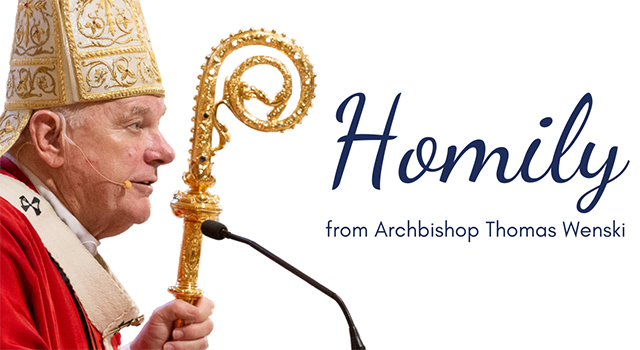By Archbishop Thomas Wenski - The Archdiocese of Miami
Archbishop Thomas Wenski preached this homily while celebrating Mass at St. John Vianney College Seminary in Miami, Oct. 19, 2023.
Last week, in Tallahassee, I was able to participate with Bishops (Gregory) Parkes and (William) Wack in the Closing of the Diocesan Phase of the Cause for the Beatification of the Martyrs of La Florida. The Servants of God, Antonio Inija and some 50 companions, were killed out of hatred for the faith in what is now northern Florida in the 16th, 17th, and 18th centuries.
Pope Francis frequently talks about “missionary disciples.” He constantly speaks of the need to form “missionary disciples,” not only among the clergy but also among all the People of God. As I learn more about the Florida Martyrs – made up of priests and laity, Europeans, and Native Americans – I believe that they were truly “Missionary disciples”: not turned in on themselves – (not a “self-referential” Church as Pope Francis would say) but rather they looked outward – with apostolic courage and passion. I would encourage you to visit St. Patrick’s School in Miami Beach. There in the school auditorium are some wonderful murals dating from the 1920s that depict the lives and deaths of these martyrs.
But today after an intense afternoon of meetings, the bishops join you for the Holy Mass on the feast of the North American Martyrs – John Beubref, Isaac Jogues, and their companions, who over the course of several years, during the first evangelization of the northern hemisphere of America, were also martyred in odium Fidei, in the hatred of the faith.
These men were also “missionary disciples.” They sacrificed much: the comfort of the familiar in their native land, what was for them the civilized world which they exchanged for a world of primitive living conditions and savage cruelty. They did it because they believed that the Gospel mattered – that it was a matter of life or death, of salvation or condemnation. And they believed that the lives of these aboriginal peoples were worth saving – even if it meant they would die trying. The blood of the martyrs is the seed of faith.
St. Isaac Jogues was, in a way, martyred twice: He was first captured and during a long imprisonment he was tortured and mutilated. He experienced starvation, illness, and torture. He was forced to watch the killing of Christian converts. He spent thirteen months as a slave before escaping to France.
He could have remained there as a living hero. Instead, he went back as a missionary. Before returning, this Jesuit priest had to request a dispensation from the pope. According to the then Church law, a priest needed “canonical digits” to celebrate Mass, and several of his fingers had been cut, chewed, or burnt off.
The pope granted the request, saying, “It would be shameful that a martyr of Christ not be allowed to drink the Blood of Christ.”
And so, with a special dispensation from the pope to celebrate Mass with his mutilated fingers, he returned and was, in short order, martyred by the Indians he wished to win for Christ.
Last week, we also celebrated the feast day of St. Teresa of Avila. She also famously said: “Christ has no body now but yours. No hands, no feet on earth but yours. Yours are the eyes through which he looks with compassion on this world. Yours are the feet with which he walks to do good. Yours are the hands through which he blesses all the world. Yours are the hands, yours are the feet, yours are the eyes, you are his body. Christ has no body now on earth but yours.”
St. Isaac Jogues, who also left a significant amount of correspondence, said: “My hope is in God who has only us with whom to fulfill his plans. It is for us to be faithful and not to spoil his work by our cowardice.”
The priesthood is not meant to be a comfortable career. Pope Francis often insists on this, and in doing so he often makes us priests and bishops a bit uncomfortable. We may not have to experience the privations of the North American martyrs or the Martyrs of La Florida – although today there are “missionary disciples” who still do. But, in a world where God matters less and less to our contemporaries, we will encounter incomprehension and opposition as they did, and as Jesus and his disciples did.
As priests we will be inevitably “signs of contractions” – unless, of course, we allow ourselves to be co-opted, to be corrupted by a sense of entitlement, by a clericalism that makes us resemble the Scribes and Pharisees more than Jesus’ “meek and humble of heart.”
In his seemingly harsh critique of the Pharisees and Scribes, Jesus wants us to understand what piety does not look like. The way to God is not in the piety of pride and rules. God’s love is not about “pointing fingers.” Rather, it is about extending a helping hand.
St. Isaac was not afraid to offer the help of his mutilated hands for God to use to fulfill his plans. May he intercede for us that we may likewise place ourselves at God’s disposal so that we help to fulfill his plans with apostolic courage and passion.

